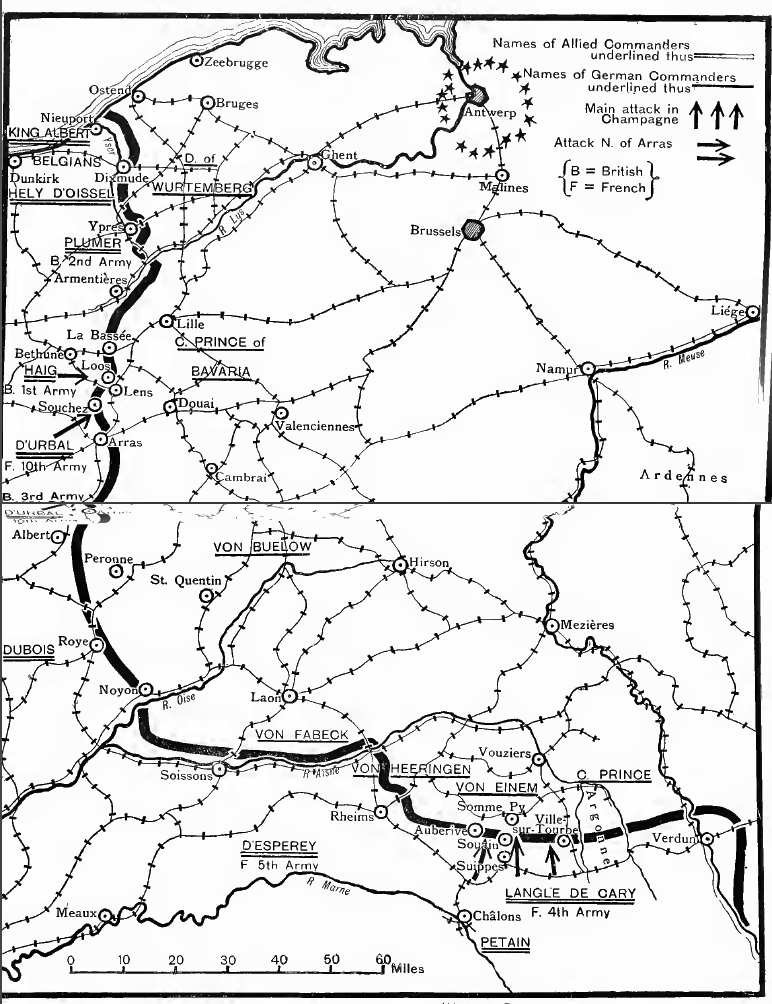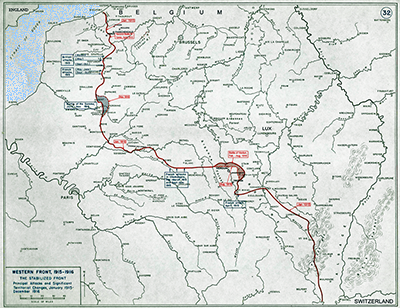First World War Project
Home News - October 1915
The Western Front continued largely "stabilised" from January 1915 to the end of 1916. Perhaps the mood surrounding events in the Gallipoli Peninsula is revealed by General Ian Hamilton in his Despatch of 26th August 1915:-
"Finally, if my despatch is in any way to reflect the feelings of the force, I must refer to the shadow cast over the whole of our adventure by the loss of so many of our gallant and true-hearted comrades. Some of them we shall never see again; some have had the mark of the Dardanelles set upon them for life, but others, and, thank God, by far the greater proportion, will be back in due course at the front."
Official records in Britain concede that October marked the beginning of a period in which the Germans obtained mastery in the air on the Western Front (due to the Fokker machine). A mastery that only came to an end towards April 1916. This made life in the Allied trenches more hazardous from direct attack as well as from better German intelligence about the disposition of ground forces.
Allied troops arrive at Solonika (3rd October), provoking Greek Government protests, but they retain a neutral stance.
Bulgaria gets drawn into hostilities and received a series of ultimatums from the Entente Powers - Bulgarian and Serbian forces open hostilities (11th) and Britain breaks of diplomatic relations (13th). The opening of hostilities in this arena led to a widening of conflict - France declares "state of war" on Bulgaria (16th) followed by Russia and Italy.
A name that resonates from this period is that of Miss Edith Cavell, who is shot (12th October) in Brussels by order of a German court-martial.
The extent of conflict became increasingly 'worldwide' - everywhere that the main protagonists had an imperial foothold. On 30th October, there was a third Allied attack on Mora (Cameroons), the second action of Krivolak (Macedonia) took place.
The last meeting took place on 30th October of the Dardanelles Committee of the British Cabinet.
From 25th September and through October, the Allied Autumn offensive began - in which our two Doddington men lost their lives on 13th October. Including, the Battle of Loos, 3rd Battle of Artois and 2nd Battle of Champagne. These battles continue until 6th November when the 2nd Battle of Champagne came to a halt.
Captain Lord Teynham in the Trenches
| Kent Messenger of 2nd October 1915 |
| Captain Lord Teynham, who is the 18th Baron and takes his title from the village of that name between Sittingbourne and Faversham, is in the trenches with his Regiment, the 6th Buffs (East Kent Regt.) Lord Teynham, who is 48 years of age, was a Captain in the East Kent Yeomanry for some years previous to the war. |
Lynsted Birth (some positive news!)
| Kent Messenger of 16th October 1915 |
CROFT. October 9th. at Mill Cottage, Lynsted, Sittingbourne, to Mr. and Mrs. W.G. Croft - a son. |
† - Eighteenth Loss in the Kingsdown with Creekside Benefice - 13th October; nr. Hulluch, Belgium.
Private Percy FORSTER (of Chequers Hill, Doddington), Killed in action, aged 29 years |
† - Nineteenth Loss in the Kingsdown with Creekside Benefice - 13th October; nr. Hulluch, Belgium.
Private Harry Victor HIGGINS (of Chequers Hill, Doddington), Killed in action, aged 18 years |
Most severe airship attacks - 13th October
An attack on the East Coast and London led to 200 casualties. Comparable events took place on 19th January and 31st May 1915, 19th October, 1917, and 5th August, 1918.
Nurse Edith Cavell Executed - 13th October
There was widespread reportage and revulsion at the summary execution of Edith Cavell by German authorities in Belgium. The British public first heard of the event through a Press Bureau statement from the Foreign Office:-
"The Foreign Office are informed by the United States Ambassador that Miss Edith Cavell, lately head of a large training school for nurses at Brussels, who was arrested on August 5 last by the German authorities at that place, was executed on the 13th Inst., after sentence of death has been passed on her.
It is understood that the charge against Miss Cavell was that she had harboured fugitive British and French soldiers and Belgians of military age and had assisted them to escape from Belgium in order to join the colours.
So far as the Foreign Office are aware, no charge of espionage was brought against her."
Lynsted Parish Council Argues for Child Labour on Farms
Lynsted Parish Council Minutes of 18th October 1915: Proposed by Rev T J Sewell, seconded Mr T L Ackerman, the Council resolved - "That the Lynsted Parish Council is of opinion that in view of the extreme scarcity of labour in this district, children of more than 12 years of age, who have bona fide employment suited to their strength & capability should not be prosecuted for non-attendance at school." - this resolution was forwarded to the Faversham School Attendance Committee.
You can read more about the national debate in our dedicated page on "Children at War".
New Commander of Mediterranean Expeditionary Force appointed
| Daily Express of 19th October 1915 |
NEW COMMANDER AT THE DARDANELLES. SIR IAN HAMILTON RETURNING. HIS SUCCESSOR GENERAL SIR C.C. MONRO. War Office, Monday, 11.55pm General Sir C.C. Monro, K.C.B., has been appointed to the command of the Mediterranean Expeditionary Force in succession to General Sir Ian Hamilton, C.C.B., D.S.O., who is returning to England to make a report. The "Daily Express" exclusively stated yesterday morning that an important promotion for General Sir C.C. Monro would shortly be announced. |
Equal Pay for Women in Munitions Work
| The Times of 23rd October 1915 |
WOMEN'S WAR WORK.- OFFICIAL SCHEME OF PAY. - EQUALITY WITH MEN.
There are several other recommendations of a technical character, the principle on which the recommendations proceed being that on systems of payment by results equal payment shall be made to women as to the men for an equal amount of work done. Any question which arises as to the interpretation of the recommendations shall be determined by the Minster of Munitions. |
RANGE WARDEN KILLED AT LYDD – Justifiable Homicide
| The Whitstable Times and Tankerton Press of 30th October 1915 |
| Two patrols of the Kent Cyclist Battalion on coast duty near Galloways, Lydd, between 1 and 2 a.m. on Sunday [24th October], saw a man acting in a suspicious manner. They challenged him, but got no reply. They fired a shot, and the man ran away. Two other shots were fired, but although a search was made, nothing could be found of the man. Between five and six o'clock the same morning, however, the body of a man was found near Galloways, shot through the head. It was afterwards identified as that of Henry Viney, aged 56, a range warden at Lydd Camp, who lived at 7, Wolseley Terrace, Lydd. Underneath the body was found a double-barrelled gun, fully loaded, but having one cartridge discharged. At the inquest on Monday the evidence showed that Viney's death was due to a bullet which had ricocheted. The jury returned a verdict of "Justifiable homicide." |
Disgusted of Luddenham - Vicar resigns because of cold and damp
| Whitstable Times and Herne Bay Herald of 30th October 1915 |
| RESIGNATION OF THE RECTOR OF LUDDENHAM. The Rev. S. Faithorne Green, Rector of Luddenham, is resigning the living after a stay of little more than a year, and leaves at the end of the present month. He was inducted to the living from which the Rev. Barrington S. Wright retired in the previous March on August 9th, 1914, prior to which he had been Rector of Charlton, Dover, since 1889. The rectory house at Luddenham is very old, and the fact that the ground about it is water-logged makes it an undesirable place of residence. When Mr. Green came to the parish the erection of a new rectory was mooted and settled, the Ecclesiastical Commissioners promising a grant of £1,500 towards the cost. The war, however, has put the project out of the question, owing to the greatly increased cost which would be involved, and feeling that he cannot face another winter in the old house, Mr. Green has tendered his resignation to the Lord Chancellor, who has the patronage of the living. |
The King Appeals for more sacrifice
| Whitstable Times and Tankerton Press of 30th October 1915 |
BUCKINGHAM PALACE At this grave moment in the struggle between my people and a highly organised enemy who has transgressed the Laws of Nations and changed the ordinance that binds civilized Europe together, I appeal to you. |
ARTEFACTS - Background Records...................
Map of opposing formations in 1915



 World War 1 Pages
World War 1 Pages